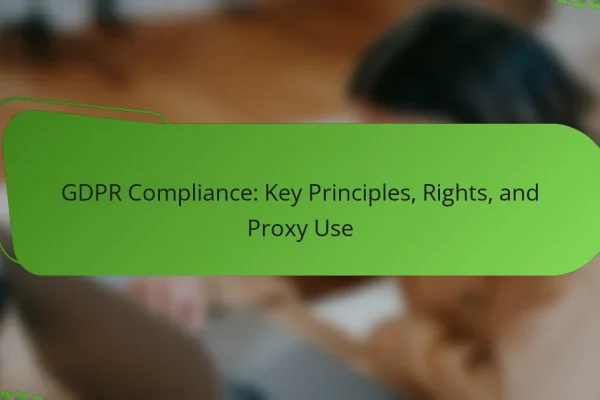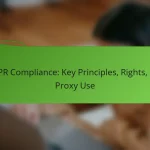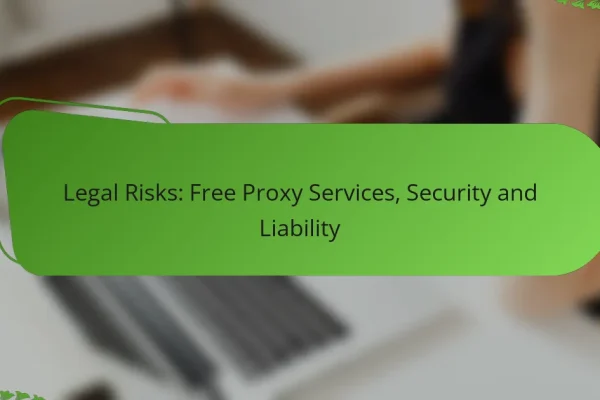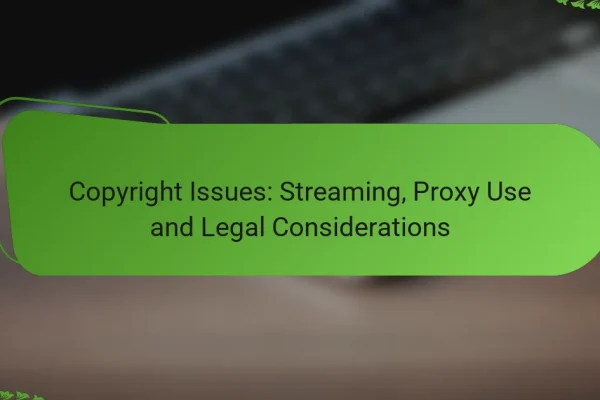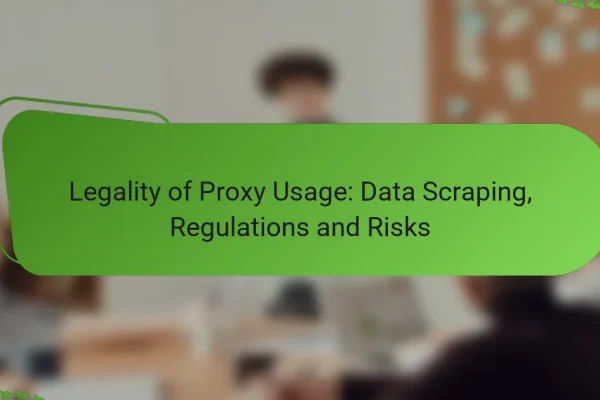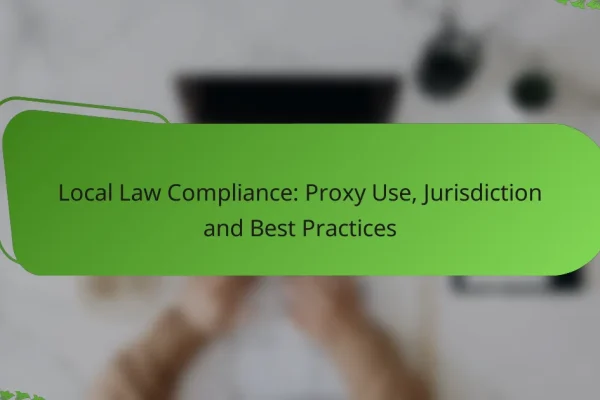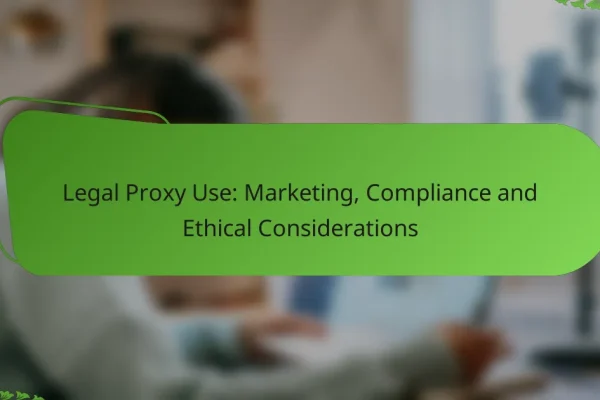What are the legal implications of using proxies in the UK?
Using proxies in the UK can have significant legal implications, particularly concerning data privacy and compliance with various regulations. It is crucial to understand how these laws apply to proxy usage to avoid potential legal issues.
Compliance with GDPR
Under the General Data Protection Regulation (GDPR), using proxies can raise concerns about data processing and the handling of personal information. If a proxy service processes personal data, it must comply with GDPR principles, including obtaining consent and ensuring data security.
Organizations should assess whether their use of proxies involves personal data and consider appointing a Data Protection Officer (DPO) if necessary. Failure to comply with GDPR can result in hefty fines, potentially reaching millions of euros.
Data protection laws
In addition to GDPR, the UK has its own data protection laws that govern the use of proxies. The Data Protection Act 2018 complements GDPR and imposes specific obligations on data controllers and processors. Understanding these laws is essential for any entity using proxies to collect or process data.
Businesses should implement measures such as data minimization and regular audits to ensure compliance with data protection laws. Non-compliance can lead to legal actions and reputational damage.
Intellectual property considerations
Using proxies can also raise intellectual property (IP) concerns, especially if they are employed to bypass geographical restrictions on content. This practice may infringe on copyright laws, leading to potential legal consequences.
It is advisable to review the terms of service of any content accessed through proxies to avoid IP violations. Organizations should seek legal counsel if they are uncertain about the implications of using proxies for accessing copyrighted material.
How can businesses ensure compliance when using proxies?
Businesses can ensure compliance when using proxies by establishing clear policies and frameworks that align with relevant regulations. This involves understanding the legal landscape and implementing best practices for proxy usage to mitigate risks.
Implementing a compliance framework
A compliance framework provides a structured approach for businesses to manage their proxy usage in accordance with legal requirements. This framework should include guidelines on data protection, user privacy, and acceptable use policies.
Key components of a compliance framework may involve training employees on legal obligations, defining roles and responsibilities, and establishing procedures for monitoring proxy activities. Regular updates to the framework are essential to adapt to changing regulations.
Regular audits and assessments
Conducting regular audits and assessments helps businesses identify potential compliance gaps in their proxy usage. These evaluations should review adherence to established policies, data handling practices, and the effectiveness of security measures.
Businesses should schedule audits at least annually and consider using third-party services for an objective review. This proactive approach not only ensures compliance but also enhances overall security posture and builds trust with clients and stakeholders.
What types of proxies are legally acceptable in the UK?
In the UK, legally acceptable proxies include residential and datacenter proxies, provided they are used in compliance with relevant laws. Users must ensure that their activities do not violate privacy regulations or terms of service agreements.
Residential proxies
Residential proxies are IP addresses assigned by Internet Service Providers (ISPs) to homeowners. These proxies are typically seen as more legitimate because they originate from real devices, making them less likely to be blocked by websites.
When using residential proxies, it’s crucial to verify that the provider has obtained permission from the homeowners to use their IP addresses. This helps avoid legal issues related to unauthorized access or privacy violations.
Datacenter proxies
Datacenter proxies are not linked to a specific ISP and are instead generated by data centers. They are often faster and cheaper than residential proxies but may be more easily detected and blocked by websites.
While datacenter proxies can be used legally, users should be cautious about the activities they perform. Many websites have strict policies against scraping or automated access, which could lead to legal repercussions if violated.
Public vs. private proxies
Public proxies are available to anyone and are often free, but they come with risks such as slow speeds and potential security issues. Private proxies, on the other hand, are dedicated to a single user or organization, providing better performance and security.
Choosing between public and private proxies depends on the intended use. For sensitive tasks or business operations, private proxies are recommended to ensure compliance with legal standards and to maintain data integrity.
What are the risks of using proxies without legal oversight?
Using proxies without legal oversight can lead to significant risks, including potential legal penalties, reputation damage, and service disruption. Organizations must understand these risks to navigate the complex landscape of proxy usage effectively.
Potential legal penalties
Engaging in proxy use without adhering to legal guidelines can result in severe penalties. Depending on the jurisdiction, violations may lead to fines, lawsuits, or even criminal charges. For instance, unauthorized data scraping or bypassing geo-restrictions can attract legal action from content owners.
To mitigate these risks, organizations should consult legal experts to ensure compliance with local laws and regulations. Regular audits of proxy usage can help identify potential legal issues before they escalate.
Reputation damage
Using proxies improperly can severely damage an organization’s reputation. If a company is found to be engaging in unethical practices, such as fraud or data theft, it can lose customer trust and face backlash from the public. This damage can take years to repair.
To protect their reputation, businesses should establish clear policies regarding proxy use and ensure that all employees are trained on ethical practices. Transparency in operations can also help maintain public confidence.
Service disruption
Proxies can lead to service disruptions if not managed correctly. For example, using unreliable proxy servers can result in slow connections or downtime, affecting user experience. Additionally, if a proxy server is blacklisted, it can block access to essential services.
To avoid service interruptions, organizations should choose reputable proxy providers and regularly monitor their performance. Implementing redundancy measures, such as backup proxies, can also help maintain service continuity.
How do different industries approach proxy usage legally?
Different industries have unique legal frameworks governing the use of proxies, often influenced by the nature of their operations and the data they handle. Compliance with industry-specific regulations is crucial to avoid legal pitfalls and ensure ethical practices.
Finance industry regulations
The finance industry is heavily regulated, with strict guidelines on data privacy and security. Proxies must be used in compliance with regulations such as the Gramm-Leach-Bliley Act (GLBA) in the U.S., which mandates safeguarding consumer information. Financial institutions should ensure that any proxy service provider adheres to these regulations to avoid hefty fines.
Additionally, using proxies for trading or market analysis must comply with the Securities and Exchange Commission (SEC) rules. Institutions should conduct thorough due diligence on proxy services to ensure they do not inadvertently engage in practices that could be deemed manipulative or deceptive.
Healthcare data compliance
In the healthcare sector, the Health Insurance Portability and Accountability Act (HIPAA) sets stringent rules for handling patient data. Proxies used to access or transmit healthcare information must ensure that they maintain the confidentiality and integrity of protected health information (PHI). Any breach could result in significant legal consequences and loss of trust.
Healthcare organizations should implement robust security measures when using proxies, such as encryption and access controls, to comply with HIPAA standards. Regular audits and assessments of proxy usage are essential to identify potential vulnerabilities and ensure compliance.
Marketing and advertising standards
The marketing and advertising industry faces regulations that govern consumer privacy and data usage, such as the General Data Protection Regulation (GDPR) in Europe and the California Consumer Privacy Act (CCPA) in the U.S. When using proxies for data scraping or targeted advertising, marketers must ensure they do not violate these laws, which can lead to severe penalties.
Marketers should be transparent about their data collection practices and obtain necessary consent from consumers. Using proxies to bypass restrictions can lead to legal challenges, so it is vital to adhere to ethical standards and industry best practices.
What are the best practices for selecting a proxy provider?
When selecting a proxy provider, prioritize compliance with legal standards and robust data security measures. This ensures that your use of proxies aligns with regulations and protects sensitive information.
Evaluating provider compliance
To evaluate a proxy provider’s compliance, check if they adhere to relevant laws such as GDPR or CCPA, depending on your location. Look for transparency in their operations and whether they provide clear terms of service that outline their data handling practices.
Additionally, assess if the provider has undergone any third-party audits or certifications that demonstrate their commitment to compliance. This can include certifications like ISO 27001, which indicates a strong information security management system.
Assessing data security measures
Data security is critical when choosing a proxy provider. Ensure that the provider uses encryption protocols, such as HTTPS or SSL, to protect data in transit. This minimizes the risk of interception by malicious actors.
Furthermore, inquire about their infrastructure and whether they implement measures like DDoS protection and regular security audits. A provider that offers a clear incident response plan is also preferable, as it shows they are prepared to handle potential breaches effectively.
